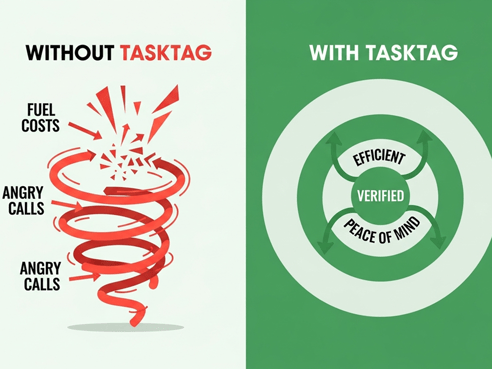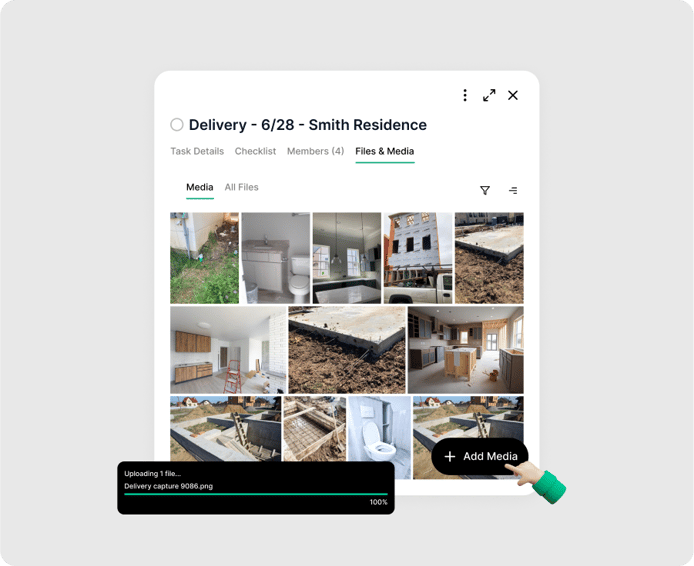TaskTag vs CompanyCam: The Best Before and After Photo Workflow for Construction Pros If you’ve...
All My Thoughts After 40 Deliveries in the TaskTag Workflow
TaskTag vs CompanyCam: Real-World Delivery Photo Proof Comparison
I’m writing this from a jobsite where I just dropped off a half-million dollars worth of rebar, next to a porta-potty, under a sign that says “Use Back Gate.”
There’s no foreman in sight. No one to sign. The wind just blew away the paper ticket. And I’m 99% sure someone will call the office in 48 hours and say:
“We didn’t get the delivery.”
This is the part where I scream into the void.
But before we get to that, let’s rewind.
Why Delivery Photo Proof Matters in Construction and Material Supply
At some point in the history of material supply, someone said:
“Just get them to sign the ticket.”
And that was the system.
But then people stopped being on site. Or they were on site but “not authorized.” Or the ticket got wet. Or lost. Or signed by someone’s 7-year-old nephew named “Jeff.”
So we added photos.
Now we had:
- A signed ticket (maybe)
- A photo (hopefully)
- A text message somewhere
- A call log no one recorded
- And a creeping sense of doom
The truth is, we weren’t documenting deliveries — we were improvising them.
And that’s how businesses get burned.
Related Article: A Day in the Life of an Office Manager
CompanyCam Photo App vs TaskTag Delivery Workflow: Key Differences
This is where two tools enter the chat:
CompanyCam Review: Strengths and Limitations for Delivery Proof
CompanyCam lets you:
- Take a photo
- Tag it
- Share it
Which is great. Until someone says:
“When did we deliver that?”
“Who was the driver?”
“Where are the notes?”
“Why are there 47 photos of drywall and no ticket?”
CompanyCam captures evidence, but it doesn’t create a system.
Related Article: Top 5 Alternatives to CompanyCam
TaskTag Delivery Photo Proof Workflow: Tasks, Checklists, and Accountability
TaskTag doesn’t think deliveries are photos. It thinks deliveries are tasks.
Which sounds boring until you realize:
- Tasks can be assigned
- Tasks can have checklists
- Tasks live inside projects
- Tasks have deadlines
- Tasks contain photos, notes, chats, and receipts
- Tasks are searchable
- Tasks are shareable (selectively)
In other words: your delivery is now a verifiable, timestamped, human-proof record.
And that changes everything.
Related Article: TaskTag vs CompanyCam
How TaskTag Resolves Disputed Deliveries with Clear Photo Proof
 Let’s break down what happens — emotionally — when a delivery gets disputed:
Let’s break down what happens — emotionally — when a delivery gets disputed:
- You get the call: “Hey, we never got that.”
- You say: “We definitely delivered that.”
- You check: no ticket, no photos, no notes.
- You question your sanity.
- You question your team.
- You re-deliver it on your dime.
- You cry inside.
Now imagine if that same call led to:
“Actually, here’s the task.
Assigned to Juan.
Delivered on 6/28 at 10:14 AM.
Photos attached.
Signed ticket.
Chat log.
Shared with Steve that day.”
Suddenly, the emotional journey is:
- Calm.
- Confident.
- Maybe even smug.
Why This Matters: The Business Impact of Reliable Delivery Documentation
Deliveries aren’t just logistics — they’re promises.
And when you don’t have structured proof, you’re just hoping those promises don’t come back to haunt you.
That’s fine for a small team doing 10 deliveries a week.
But for 30 deliveries a day across 15 job sites?
Hope is not a strategy.
Beyond Photos: Structured Delivery Tracking with TaskTag vs CompanyCam
Photos are helpful. But photos are not a system.
You need:
- Context: What was delivered? Where? Why?
- Accountability: Who pulled it? Who dropped it?
- Searchability: Can I find this in 2 seconds?
- Structure: Is there a checklist? A deadline? A status?
- Control: Can I share this with the client — without oversharing?
TaskTag is the only tool that brings all of that together — without turning your drivers into IT managers or your dispatchers into therapists.
How to Use TaskTag for Delivery Photo Proof and Tracking

If you want the actual workflow — like how to set up projects, assign tasks, add checklists, upload photos, and share with clients — it’s all here:
👉 TaskTag’s Official Delivery Workflow Guide
This post isn’t that.
This post is just me yelling that your current system might be quietly destroying your team’s sanity.
From Photo Buckets to Smart Delivery Workflows: Why Contractors Choose TaskTag
The real shift TaskTag creates isn’t technological — it’s philosophical:
- From: “Take a photo and hope for the best.”
- To: “We don’t hope. We know.”
It’s the boring stuff — like naming tasks well, using checklists, and assigning responsibility — that actually saves your team from chaos.
TaskTag doesn’t make your job flashier. It just makes it sane.
Related Article: Mastering Construction Project Management
CompanyCam vs TaskTag: Which Delivery Photo Proof Solution Wins?
I’ve lived both lives:
- The “I think we delivered it” life
- The “Here’s the task, with proof” life
Only one of them lets me sleep at night.
So if you’re still running your delivery operation on text messages, trust, and blurry photos from someone’s camera roll...
You deserve better.
Related Posts You Might Enjoy:
- Punch List Showdown: TaskTag or CompanyCam?
- Comparing Daily Field Report Workflows: TaskTag vs. Jobber for Construction and Service Pros
- The Ultimate Daily Field Report Checklist for Busy Contractors
Want to actually fix your delivery photo proof system?
Start with this:
👉 TaskTag’s Delivery Workflow Guide
And maybe bookmark this post for the next time someone says:
“We never got that.”
You’ll smile. Copy the task link. And send it.
And somewhere, Jeff will weep.
Interested in TaskTag? Sign up here or book an onboarding session see how it fits your business. For more comparisons and tips, subscribe to our blog or share this post. Let's keep the conversation going!
Ready to explore how TaskTag can transform your construction projects?
Start your free trial today and see the difference!




